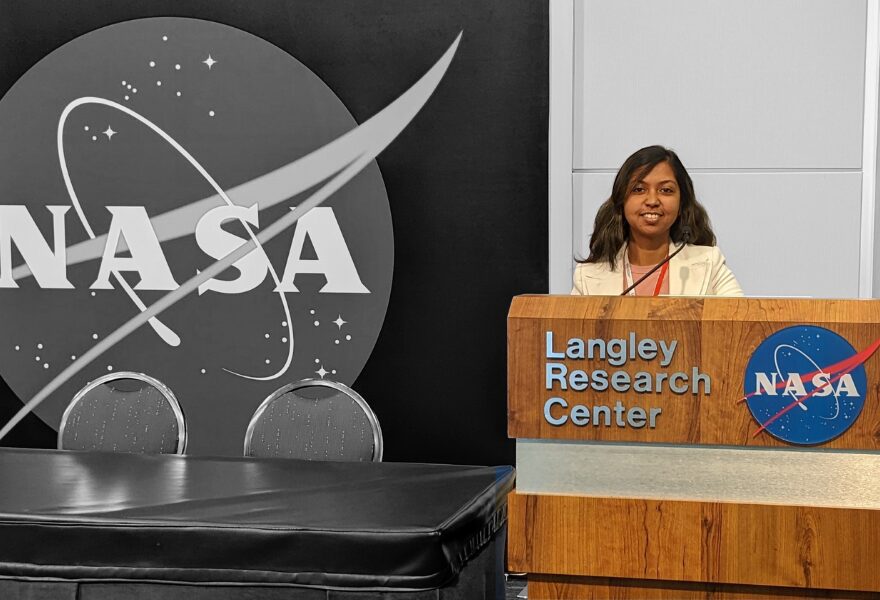[Read time: 3 min]
From Grace Hopper to Joy Buolamwini, AnitaB.org is proud to be from and for strong women and non-binary technologists. This women’s history month, we’re honored to recognize amazing women who have built careers to technology, while championing diversity within the industry. Awalin Sopan, a passionate technologist and data enthusiast, is one such woman. We were excited to chat with her about her role as a community leader, the importance of inclusion, and her experience as a technologist in government.
In what way has mentoring or mentorship impacted your personal or professional growth?
Awalin: “My mentors played a pivotal role in helping me achieve my long-held dream of working in civic tech. Through their encouragement and support, I felt confident in my decision to become a Presidential Innovation Fellowship (PIF) and serve the Small Business Administration.
I approach mentorship interactions as an opportunity to learn and share experiences. It’s important to be open-minded about what mentorship looks like – I have had the opportunity to learn from a diverse group of mentors, including other innovation fellows, the VP of a former employer and, colleagues looking to expand their skillset. By discussing and asking questions about qualities like confidence and decisiveness, I have been able to develop these traits within myself, take risks, and pursue my passions.
The expertise and guidance I’ve received is invaluable and I am committed to paying it forward by mentoring others, particularly women in Black, Latin, Native American, Pacific Islanders and the many other underrepresented Asian communities, who are and have historically been largely excluded from STEM fields.”
How is your experience in civic tech and the public sector shaping your approach to innovation and leadership?
Awalin: “As technologists, we often expect that things should work, work properly, and work for everyone. It doesn’t take much to understand that’s not the current reality, leading to the realization that if we see something that needs to be done, we’re the ones who are going to have to do it. “We”, meaning women and non-binary people from all sorts of intersectional backgrounds who have traditionally been excluded from the creation process, thus leading to systems and technology that don’t work for everyone.
I have been working in the software industry for more than a decade, with previous work experience in big tech having solidified my technical foundation. This background, in addition to my current role in the public tech sector, provides the perfect opportunity to build inclusive technology. Beyond creating technical solutions, our job is to bring people together and foster communication and collaboration. We approach our goals strategically and then work backwards, which is important for technologists who don’t usually have the chance to voice their vision despite having expertise.
As a public servant at the Small Business Administration (SBA), I get to build human-centric data systems, which I love. I make data work for people and contribute to data-driven policies for entrepreneurial communities, ultimately assisting senior government leaders shape the future for a nation that works better for everyone. In Speaking of systems that work better for everyone – on March 27 the White House announced an expansion to the SBA’s Women’s Business Centers with the goal of assisting women entrepreneurs through training, mentoring, business development, and financing opportunities.”
Know an amazing woman or non-binary technologist within the US federal government working to improve governmental services through technical innovation (for 5+ years)? Nominate them for the Tech in Government Abie Award!
Why is inclusion important for women and non-binary people of all backgrounds in Tech?
Awalin: “I grew up in Bangladesh. When I was a child, my family used to tell me that if I did not score good grades, they would marry me off, find a husband for me, and I’d have to “deal with” it. While my parents said it as a joke, but this is the reality for most girls in developing countries. We are responsible for earning our basic human rights and approval from our families.
For a boy, it’s enough to just exist.
For others, we must prove that we are worthy of our existence, even to our family. In college, I was part of a class with less than 10% women students. In my first job, I was the only woman in the engineering team. When I moved to the US for higher education, I found it was the same. I also met many men working in tech who did not like the field at all, instead were “stuck” in tech because of the income prospects. This imbalance in the workforce and technological opportunities felt strange since the US was the epitome of freedom and technical advancement.
And soon I realized, this issue is more global than I thought. For any marginalized people punished solely for being who they are, having technical skills is a power. Harness this power and build a technical solution that works for you and people like you. Use this opportunity to make life better, beyond economic stability. As a community member, we have first-hand experience with the problem, which makes us more capable for the job. Our compassion, insights and technical expertise are equally important to formulate the solutions.
Being in the tech field means earning my livelihood by doing something I like and am good at. It was a ticket to freedom for me, and by fostering communities of inclusion we can empower and teach the next generation to claim their own freedom and build a better world for all.”
As the community leader of Systers Bangladesh, how can this community pave the way forward for women and non-binary technologists?
Awalin: “Systers Bangladesh is one the newest affinity groups of AnitaB.org that gives us an opportunity to inspire, support and guide each other. Despite many obstacles, Bangladeshi women in tech are making incredible efforts, and breaking barriers both at home and abroad. This is a platform to connect with other communities too, and to highlight each other’s unique struggles and success stories, while preserving our individuality. In western culture, we notice that the concept of ‘Asian women’ is used in a monolithic sense, lumping the diversity of an entire continent into one statistic, failing to serve anyone. When we talk about women in tech, we need to think about women from all over the world, and how we all have our diverse perspectives and creative ways of problem solving.”
Learn more about AnitaB.org Systers Affinity groups to advance your career development and connect with other members of your self-identified culture!
About Awalin Sopan
Awalin Sopan is a passionate technologist serving America’s Small Businesses through the Small Business Administration. Her family is spread across three continents speaking multiple languages, making her even more appreciative of the different landscapes, cultures & cuisines around the world.
Read more posts from the thread The Journey of Launching Motivity Care, a HealthTech SAAS Start-up, With Karina Muller


